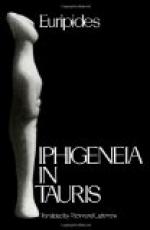P. 8, 11. 124-125.—The land of Tauris is conceived as being beyond the Symplegades, or, as here, as being the country of the Symplegades.
As these semi-mythical names settled down in history, Tauris became the Crimea, the Symplegades, or “Clashing Rocks,” or “Dark-Blue Rocks,” became two rocks at the upper end of the Bosphorus, and the Friendless or Strangerless Sea became the Euxine. The word Axeinos, “Friendless,” has often been altered in the MSS. of this play to Euxeinos, “Hospitable,” which was the ordinary prose name of the Black Sea in historical times.
P. 9, l. 133, The horses and the towers.—The steppes of the Taurians would have no gardens or city walls, but it is curious that Hellas should seem specially a land of horses by comparison. Cf. p. 86, l. 1423, where Thoas has horses.
P. 10, l. 168, The golden goblet, &c.—She evidently takes jars of libation from the Attendants and pours them during the next few lines into some Eschara, or Altar for the Dead. Most of the rite would probably be performed kneeling.
P. 11, ll. 192 ff., The dark and wheeling coursers.—i.e. those of Pelops. The cry of one betrayed: Myrtilus, when he was thrown into the sea. (See on l. 1.) For the Golden Lamb and the Sun turning in Heaven, see my translation of Electra, p. 47, l. 699 and note.
P. 12, l. 217, The Nereid’s Son.—Achilles, son of Peleus and the Nereid Thetis.
P. 13, l. 238, The Herdsman’s entrance.—Observe how Iphigenia is first merely disturbed in her obsequies: then comes the sickening news that there are strangers to sacrifice: then lastly, her worst fear is realised; the men are Greeks. This explains her exasperated tone in l. 254, “The sea! What is the sea ...” and “Go back!”—The Herdsman is merely jubilant and obtuse.
P. 15, l. 263.—The murex or purple-fish could only be collected in very late autumn or early spring; consequently the fishers made encampments for the winter and returned to Tyre and Sidon, or wherever else they came from, after the spring fishing. See Berard, Pheniciens et Odyssee, i. 415.
P. 15, 1. 270, Son of the White Sea Spirit, &c.—The man is, of course, made to use the names of Greek not of Taurian gods. He thinks first of Palaemon, a sea-god, son of Leucothea ("White-Goddess"), then of the Dioskori, Castor and Polydeuces; then vaguely of some spirits beloved of Nereus, the Ancient of the Sea.
P. 17, 1. 328 f., Of all those shots not one struck home.—The object of this statement must be to explain why the two heroes do not make their appearance bruised and dishevelled as the Second Messenger does after his fight with the Greeks. Of course there is no great harm in making the Taurians bad shots as well as cowards, and possibly there is some value in the suggestion of a supernatural protection which is only saving its object for a crueller death. But very likely the two lines are interpolations.




